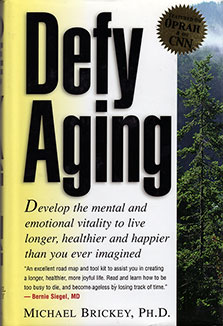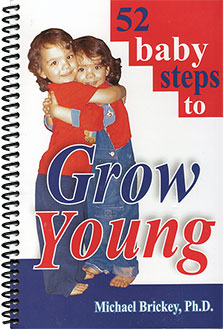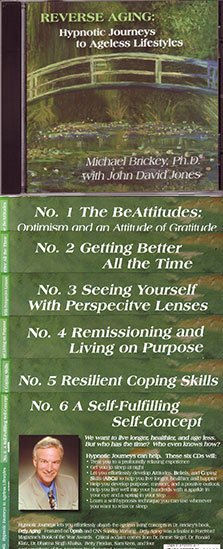The Defy Aging Newsletter
Anti-aging psychology, holistic health, and wellness
These are archives of a biweekly e-mail newsletter for helping you think, feel, look, and be more youthful and live with purpose.
March 26, 2009 Number 206
This issue:
What You Need to Know About Heart Disease
Action to take
Even if you don't have heart disease and but you are over 40, get a cardiogram once a year.If you have heart disease, don't hesitate to see a psychologist, preferably one who has training and experience in health problems.
Why
If you or someone you love has a heart attack, the doctor probably gives you a brief technical report. Anxiety levels are so high you only hear a small fraction of what the doctor says, and remember even less. Typically, there is no discussion about the psychological factors and dealing with the stress, changes, and how different your life has become. Cardiologist Dr. Joel Okner and Cardiac Psychologist Dr. Jeremy Clorfene, authors of The No Bull Book On Heart Disease, step in to fill the gap. Dr. Joel Okner is a Board Certified Cardiologist who works closely with Dr. Jeremy Clorfene, a cardiac psychologist. Their just out book is The No Bull Book On Heart Disease: Real Answers To Winning Back Your Heart and Health. I had the pleasure of interviewing them on Ageless Lifestyles® LLC.
It is easy to miss how unique what Dr. Okner and Dr. Clorofene are doing. First, they put cardiology in language that lay people can understand and use. In their book, in particular, they take you step-by-step through exactly what happens physically and emotionally with various diagnoses, tests, and surgeries. That kind of information is surprisingly hard to find. The even more profound thing they do is address how heart disease impacts patients and families emotionally.
Managed care initially offered great promised. Kiser Permanente in particular, was very good at offering supportive and preventive services to help subscribers avoid even bigger problems down the road. Thus, managed care done right would encourage every heart disease patient to see a cardiac psychologist. But most of managed care deteriorated to cost containment. Thus we are left with a perfect storm that largely ignores the psychological needs. Pharmaceutical companies advertise pills as the solution. Patients want pills and quick fixes, and compensation for doctors encouraged 5-minute-medicine. Even the rehab programs medicalized rehab and made it mostly about diet, exercise, and physical therapy.
The Okner and Clorofene message is that pills may be necessary but without addressing stress, lifestyle, exercise, and nutrition, a heart attack or stroke is just around the corner. The same could be said for people with diabetes. My suggestion for finding a psychologist who is particularly familiar with heart disease and other health problems is to: contact a hospital’s Medical Staff office and ask for a list of psychologists who are on the medical staff or affiliate staff.
There are two areas I disagree with them. One is that from seeing a never ending line of heart patients, they have developed a perspective that everyone is stressed out and broken. Maybe most of us, but I think there is a sizeable number of people who are not. We need to believe it is possible to have a manageable amount of stress in our lives and manage it well. We need to seek role models and lifestyles that lead to good mental and physical health.
My other disagreement is that while I understand that Dr. Okner is being very honest and scientific when he says the data on supplements are inconclusive, that leaves heart patients on their own on a very vital health decision. I would like to see cardiologists provide some guidance as to which supplements appear to be helpful, which ones are very questionable, and which ones might actually do harm. Apparently, the most potential harm comes from people who take the anti-coagulant blood thinner Coumidin and supplements, herbs and spices than thin the blood.
The list is long and includes: aspirin, fish oil, Vitamin E, St. John’s Wort, co-enzyme Q-10, dong quai, feverfew, garlic, curry, cayenne pepper, ginger, paprika, thyme, cinnamon, dill, oregano, turmeric, licorice, and peppermint. Severalsupplements, herbs, and spices lower LDL cholesterol and a few raise HDL cholesterol or help with triglyceride levels. Just passing on the issue leaves heart patients likely to make decisions on poor information. This is especially a problem as half of heart patients don’t take their medications as prescribed and many use supplements.
You can hear the 50 minute podcast at Ageless Lifestyles® LLC
Quotes
To keep the heart unwrinkled, to be hopeful, kindly, cheerful, reverent that is to triumph over old age.
~Thomas Aldrich
Humor
If a 911 operator has a heart attack, whom does he/she call?
I'm addicted to placebos. I'd give them up but it wouldn't make any difference.
~Jay Leno
Reprint this article from:
THE DEFY AGING NEWSLETTER
Anti-Aging Psychology
Holistic Health and Wellness
This newsletter article may be reprinted in E-zines, newsletters, newspapers, and magazines provided the content is not edited and the attribution below is given. Formatting may be changed and you may use one of the web site pictures of the author to accompany the article.
"Dr. Michael Brickey, The Anti-Aging Psychologist, teaches people to think, feel, look and be more youthful. He is an inspiring keynote speaker and Oprah-featured author. His works include: Defy Aging, 52 baby steps to Grow Young, and Reverse Aging (anti-aging hypnosis CDs). Visit www.NotAging.com for a free report on anti-aging secrets and a free newsletter with practical anti-aging tips."






